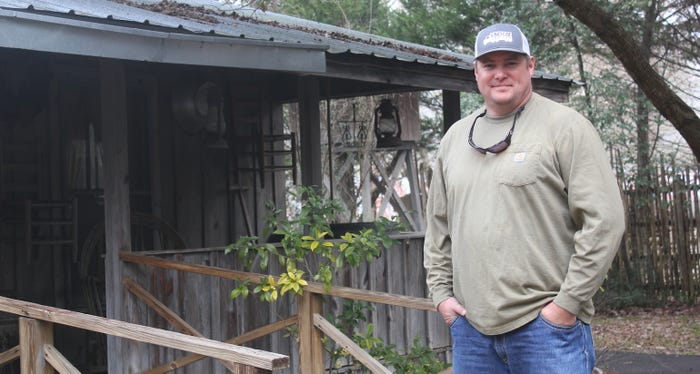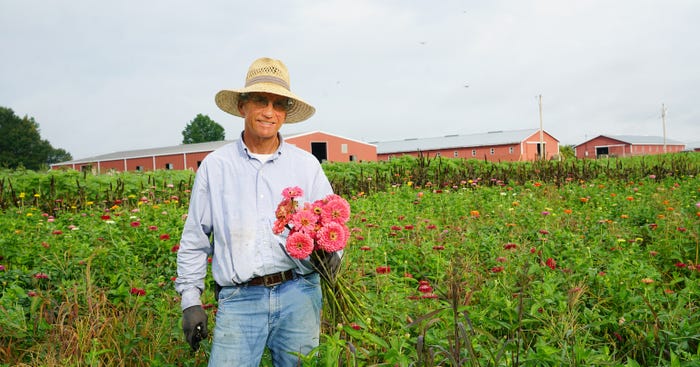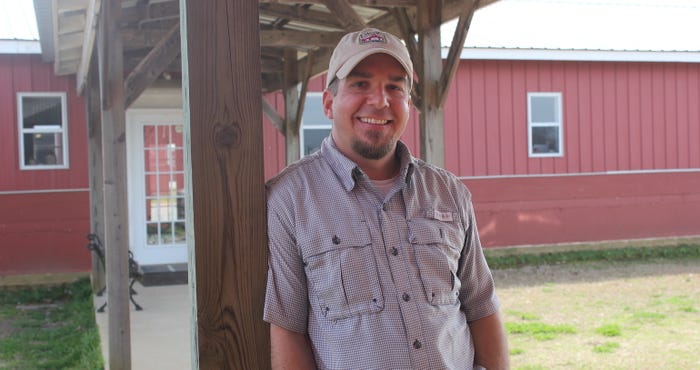
Josh Upton, along with his family, manage Landrum’s Homestead and Village in Laurel, Miss. Ginger Rowsey
Landrum’s Homestead and Village is one of the largest agritourism operations in South Mississippi. This living history museum located in Laurel, Miss., takes visitors back in time. And they come back time and again.
According to Josh Upton, his grandfather and village founder, Tom Landrum, did not set out to create a tourist attraction. But when Landrum paired his building and woodworking skills with his passion for history and education, something special happened.
“He always claimed he got bored easily,” Josh recalled. “He got this idea to build a log cabin in the pasture behind our family’s furniture store. He wanted to have a place to store some of the family antiques, and I think he wanted to give the grandkids something to do.”
Motorists passing on Highway 15 soon noticed the building project. When it was completed, they asked to tour the cabin. Then they asked what was coming next.
“One thing led to another, and he decided to build a little homestead — barn, blacksmith shop, outhouse, and the grist mill,” Upton said. “We started doing field trips. People started donating old farm equipment and tools. Then he decided to build a little village — general store, smoke house, chapel. A teacher came on a field trip and said she wanted to get married in our chapel. It just snowballed from there.”
Today, Landrum’s Homestead and Village contains more than 80 buildings spread across 30 acres. They are open year-round, hosting weddings, field trips and seasonal festivals. Their premier event “Christmas at the Homestead,” kicks off a busy holiday season that includes candlelight tours and special musical performances.
“There’s no end in sight for the homestead,” Upton said. “We’re adding and changing all the time, and probably always will be.
Agritourism continues to grow
When Tom Landrum built his first homestead cabin back in the early 1990s, few people had even heard the term agritourism. But it is a venture that has continued to grow, and in an increasingly urban society, it’s one of the few meaningful ways to connect people to agriculture.
The U.S. Census of Agriculture first began using the term “agritourism” in 2007. Since then, it has tracked its growth, up 67% in the first 10 years. More than 28,000 farms across the country now embrace agritourism, resulting in nearly a billion dollars in direct sales from people visiting those farms. Agritourism activities range from educational to pure entertainment. From corn mazes and pumpkin patches to the latest trend of offering countryside accommodations to break up the monotony of the work-from-home routine.
In many instances, agritourism activities are a way to respond to changing trends in both agriculture and consumer behavior. That was the case for Falcon Ridge Farms in Toone, Tenn.
Ray and Mary Ellen Gilmer family purchased the 240-acre farm in 2000. Ray is a world champion horseman, and the Gilmers initially used Falcon Ridge as a horse training and breeding operation. But they began to notice fewer young people entering the horse business — a trend that was accelerated by the economic recession of 2007.
“We wanted to do something that would continue to support our families and that would also take advantage of the infrastructure we already had,” said Bart Gilmer, the Gilmers’ youngest son who manages agritourism on the farm. “It was also important that it was something we liked.”
In 2009 Falcon Ridge hosted its first fall festival. The following spring the Gilmers added an Easter event. Around the same time, they began truck patch farming. Like the Landrum family, the Gilmers’ agritourism venture began to snowball.
Today the Gilmers grow more than 40 different crops, as well as flowers and Christmas trees. They sell produce and fresh cut flowers through multiple farmers markets and a CSA/farm share program. The Christmas trees are chosen and cut by families on the farm.

They still host a Harvest Festival that now runs for six weeks, along with a special Easter weekend on the farm. They have become a popular destination for local school field trips. Each season at Falcon Ridge continues to offer a growing list of activities.
“One goal we’ve had is trying to add one attraction per year,” said Bart. “We want to be built on family traditions, but we don’t want you to get bored, either.”
Covid concerns
Agritourism has not escaped the impact of the pandemic, particularly during Spring of 2020, when there were heavy restrictions and closures that adversely affected revenue. Cancellation of school field trips negatively impacted many operations and most schools have still not resumed off-campus field trips.
“Agritourism operations incurred higher costs for just about everything they purchased and implemented additional procedures for cleaning and keeping people healthy,” said Megan Leffew, Extension specialist with value-added agricultural marketing with the University of Tennessee. “Many farms capped attendance at any one time to make sure there was plenty of room for social distancing and implemented this by requiring tickets be purchased online in advance for a specific time to arrive at the farm. Some operators chose to keep a few activities that were harder to clean/sanitize as effectively closed.”
But Leffew adds that in some ways, the outdoor aspect of most agritourism operations has actually helped in ways as visitors search for safer, outdoor activities.
“In many ways the pandemic has been tough for us because people aren’t traveling like they were, and also the schools are not taking field trips,” said Upton. “But toward the end of 2020 we saw a lot of people that were ready to get outside and start doing something. They told us ‘thank goodness you’re doing this.’”
Bart Gilmer echoes Upton’s comments. 2020 had a rough start, but good fall weather and crowds anxious to get outdoors led to one of their best fall seasons.

“We had numerous people tell us they appreciate what we do here,” said Bart. “We have seen a boost to produce sales, as well. When people go to the grocery store and can’t find things they start to think about local produce and that maybe it is important to shop local. I think it has changed some people’s habits permanently, and they’ll continue shopping local.”
Fall fun in store
As Fall begins, agritourism season will be at its peak. And while much uncertainty still surrounds gatherings at public places and spaces, Gilmer and Upton and optimistic about the upcoming season.
“Outside open-air activities are going to be more attractive than ever. They’re getting more popular all the time. We saw a lot of first-time guests in 2020,” Bart said.
“As an industry, it’s given us confidence. We got through this. We kept our heads above water. We can do it again.”
Like any farmer, they’re just hopeful for some good fall weather.
About the Author(s)
You May Also Like






